We hear a lot about ‘hyperfocus’ and ‘distractions’ and ‘too many racing thoughts’. So, how can neurodivergent people improve our ‘focus’?
Have you ever been told you need to focus more….or that you’re too focused on one thing? Maybe you find it hard to get started on a task, or it’s uncomfortable to stop doing something you’re really enjoying.
Karys, a psychotherapist and workplace wellbeing trainer with autism, introduces us to some ways of harnessing and supporting our attention.
What does attention mean for our wellbeing and why does it link to focus?
Attention is one of our emotional needs. It’s a form of emotional nutrition that helps us to feel connected to others. It’s also a resource – we use it as a tool to help us meet other emotional needs. We can use our attention in so many ways – focusing it on people, learning, doing tasks or thinking about things that have happened or might happen!
When we feel in control of our attention, we can gain a sense of achievement from completing a task and get a sense that we are managing the busyness that everyday modern life brings.
People who are autistic or have ADHD might find their attention resource shows up differently for them. I am autistic and I often find my attention can get locked on a task, detail or topic. I can spend hours engaged in a special interest, or researching something for work and not realise how much time has passed. I have friend with ADHD who finds that their attention can be a tricky tool to use – it can become fragmented or wander in directions they hadn’t intended it to, and they can feel paralysed, unable to get started on what can appear to others to be simple things, like making a cup of tea.
So, what can we do to help ourselves and how can others be supportive of us?
How can we after our nervous systems to gain focus?
7/11 breathing is a great tool for keeping our fight and flight response in check. Neurodivergent people are often managing a lot of sensory input or navigating social expectations that aren’t clear to them (or that can be unwelcoming), and this can affect our ability to feel calm and more able to focus our attention. I used to hate it when people advised me to do breathing, because I thought it seemed like too simple a solution when everything felt so difficult! Once I realised it switched off my fight and flight response and helped my body to feel more comfortable and my brain feel much calmer, I became a huge fan! Daily 7/11 breathing for 2 minutes, before I start a task and whenever I am going into a busy environment means I am in more control of where I place my attention.
People with ADHD might find 7/11 breathing accompanied by brief bursts of movement, or a task involving their hands such as knitting or tapping useful for a reset – for example when they find themselves unable to begin a task, or they suddenly become frozen mid-way through.
Tools like muscle tension relaxation, or engaging in gentle, mindful movement such as tai-chi, yoga or qui gong can also be useful for those of us who want to feel calmer but don’t find being still comfortable. Additionally, some people find the focused movement of martial arts helpful in learning tools to feel calmer, while developing the use of their attention resource.
How can you reduce the load to focus on what matters?
There are so many daily tasks that neurotypical people do without thinking, or using much energy. This is because their memory and pattern matching resources (sometimes called executive function) work differently to neurodivergent people. Reducing the amount of demands we place on our working memory can help and there are a variety of ways we can do this.
Maybe visual prompts work well for you – could someone help you to create visual prompts for daily tasks that you could pin up in places you use regularly? Having the prompt means you don’t have to think about how to begin or how many steps there are – you can take it one step at a time. I love routines and timetable all of my daily tasks on a whiteboard. I find this means I don’t have to actively think about doing the task, my pattern matching resource kicks in and it’s easier to start. Other people like to use Apps or diaries to plan the daily tasks into, sometimes mixing up the times of day when they do them to add variety and stimulation.
Labelling cupboards and drawers or placing key equipment within easy view are all useful prompts that help to cut down the load on someone’s working memory and make it easier to put attention on the right things at the right time for that person. The bonus is it’s a great way to keep things organised and feel in control!
How can timers and alarms be useful for focused sessions?
These tools can help with starting and stopping tasks! If you know you’re likely to get locked into a task, perhaps use alarms to signal when you need to start coming away from a task and as a reminder to stop for lunch or bathroom breaks. If stopping a task straight away is uncomfortable, using the timers as a countdown to begin gradually bringing yourself out of the focused state (sometimes called hyperfocus) can make it less difficult and enable you to gradually bring your attention to other things or people.
The Pomodoro Technique can help by breaking tasks down into 25 minute sessions followed by a short break.
How can you ‘rest’ your attention?
All of us need access to privacy – time alone each day when we can problem solve, reflect on how things are going for us or just take a breather from the stimulation of the day. This gives us time to rest our attention as we can run out of it, and privacy allows us to replenish our attention stores.
Some of us will need to rest our attention more frequently than others – for example focusing our attention for 25 minutes on something, followed by a 5 minute break. This can stop our attention from becoming worn out.
Others of us might not notice our attention has run out until we come out of focused attention and suddenly realise we’re exhausted. This is why it can help to use timers and reminders to nudge us to rest our attention.
Whether you rest your attention by going for a walk, listening to calming music, lying in silence, indulging a sensory pleasure or taking some time to do 7/11 breathing, you will be able to return your focus to tasks and people more easily afterwards.
Be patient with yourself and practice
Learning the tools and techniques that help you best can take time. It can also take a neurodivergent brain longer to build new patterns, so we need to be patient with ourselves and understand that we will have good days and less good days – but every day gives us useful information about how we function best and that can help us build a life using attention in the best way for us.
Allowing ourselves to ask for help is also useful – human beings are designed to be part of groups, so asking others we trust to help us explore ways to focus our attention in healthy ways can be another way we can support ourselves.
How can others help you to maintain focus?
If you’re an employer, take the opportunity to explore how your employees’ attention resource works best for them. Everyone is more productive and creative when they are facilitated to focus their attention in the best way for them.
Helping employees meet their physical and emotional needs helps everyone, neurotypical or neurodivergent, so you might want to explore some of the resources and training on offer by Suffolk Mind’s Mental Health Toolkit to see how you can provide an inclusive and productive working environment.
Modelling positive attitudes towards neurodiversity and reasonable adaptations will help people meet their need for security and control and will reward you will a committed and innovative workforce. Perhaps by doing this, you will find out how to better meet your own physical and emotional needs and develop your own resources along the way.
What do friends and family need to know about neurodivergence?
It can be tough to see those around us struggle with everyday life and being neurodivergent can be very challenging. It’s important that you look after your own physical and emotional needs as best as possible, so you feel able to provide any support necessary.
Accepting and recognising the different ways neurodivergent relatives might need to use or manage their attention can be helpful. Can you help them create their timetables, or visual reminders? Perhaps you might be able to help set up spaces where they can access privacy or calm their nervous system by engaging in special interests? Maybe you’d like to get involved with your loved one’s special interest – it’s a great way to exchange healthy attention and build emotional connection!
Knowing that it’s OK for each of us to use and exchange attention in the ways that meet our emotional needs best and in the ways that allow our brains to function at their best can also help friends and family release themselves from the pressure of thinking they need to fix things for their loved one – it’s more than supportive enough to accept someone as they are and enjoy exploring the ways each of you can meet your needs together.
Put simply, we can begin to improve our mental health by meeting needs
Like all living things, human beings need certain things to survive and thrive. Alongside our physical needs, we have emotional needs that help us stay well and balanced.
The Human Givens Institute, an international psychotherapy organisation (www.hgi.org.uk), identifies nine emotional needs that all humans share. Meeting these in balance supports both our physical and mental wellbeing.
These emotional needs are: security, control, attention, status, community, privacy, emotional connection, achievement, and meaning & purpose. Let’s take a brief look at each one.
If you want to explore which emotional needs you’re meeting, or not, take our short anonymous survey to find out. Emotional Needs Survey.
Security
Meeting our need for security isn’t about being safe in everything we do. Life involves risk, but we need enough security in enough areas—physical, emotional, financial, at home or work—to feel calm and confident enough to take appropriate risks and live fully.
Control
Feeling in control doesn’t mean controlling everything, because that’s impossible. It’s about finding the balance between having choice and letting go of what we can’t change. I often think of the Serenity Prayer—having serenity to accept the things we cannot change, courage to change the things we can, and most importantly, the wisdom to know the difference.
Attention
We all need to receive attention from others—kind, non-judgemental, accepting attention that helps us feel seen and valued. This need is so powerful that, if we can’t get good attention, we may even settle for negative attention instead.
Status
Our need for status isn’t about being the boss or high-ranking. It’s about being appreciated and valued by those around us. A simple thank you for a job well done, a friend who recognises your sense of humour, or feeling respected for who you are—all of these meet that need.
Community
We also need to feel we belong. Just like with attention, we might accept unhealthy communities if we can’t access positive ones. That’s why it helps to belong to different groups—hobbies, workplaces, faith groups, or local hangouts. Sharing diverse ideas keeps us open-minded and connected.
Privacy
All our social needs need a counterbalance, and that’s where privacy comes in. Privacy isn’t just being alone; it’s time for our thoughts to catch up with us. Scrolling on your phone or overthinking doesn’t count. Taking even a few quiet moments to pause and let your mind wander can make a big difference.
Emotional connection
Bridging the gap between community and privacy is our need for emotional connection. These are the few people who truly accept us as we are—where we can share private thoughts without fear or judgement. Interestingly, it doesn’t always have to be a person; pets can also meet this need beautifully.
Achievement
We need a sense of achievement to feel alive and engaged. If we never stretch ourselves, boredom sets in—and boredom can be just as stressful as overwhelm. Achievement doesn’t have to be grand; it can be as simple as noticing the small wins that took effort and give you quiet pride.
Meaning and purpose
Meaning and purpose can come from many places—walking the dog, learning something new, helping others, raising a family, or being part of something bigger than yourself. When we have a sense of why we do what we do, life feels richer and more fulfilling.
It’s not about meeting every need perfectly. Too much of one can be as unhelpful as too little. These needs overlap, and the balance constantly shifts with life’s ups and downs.
When our needs fall out of balance, we might experience anxiety, anger, or depression—and sometimes this imbalance deepens before we find our way back. But recognising these needs is the first step toward feeling more in control and at peace again.
So, take a moment to reflect. How well are you meeting your own needs right now? Even small changes can create meaningful improvements in your wellbeing.
Did you know that we offer interactive, friendly training courses about the Emotional Needs and Resources approach?
Sign up to be a Friend of Suffolk Mind for free and get a free workshop space. Sign up to be a Friend.
Find out how we can support workplaces big and small with our award winning workplace wellbeing training. Take me to The Mental Health Toolkit.
Sign up to our newsletter for information and resources like this blog, straight to your inbox. We don’t send many emails a month, so you won’t feel bombarded. Sign up to the newsletter.
Jon Neal writes a monthly article for Bury Free Press, here’s one exploring fear
Nothing to Fear Day
Do you know there’s an international Nothing to Fear Day?…no, me neither. It seems there’s a day/week/month for everything now. But it gives me a reason to write some words about the nature of fear, how it’s useful, and how it can become a barrier to good mental health.
The day was so named because on that date in May 1941, President Roosevelt said “we have nothing to fear but fear itself”. I think what he was getting at was that, while fear is a useful natural thing to feel to keep us safe, sometimes it can get in the way of things that are not really a danger to us.
We fear the unknown – in our language at Suffolk Mind, we fear things that are a challenge to our needs for security and control.
A story to overcome fear with knowledge
We tell a story of a solitary lion who sees his reflection in the water and, because he has never seen another lion before, runs away scared. A butterfly lands on his shoulder and tells him it’s his reflection – gives him information, which he learns from, enabling him to overcome his fear and have a drink of water.
Fear can push us out of our comfort zone
Fear helps us learn. When we are learning anything we need a balance between fear and positive expectations to guide us.
For example, if we are learning to ride a bike, we need to see the potential rewards – being able to do what the older kids can do and have more independence – as well as the fear of falling off and scuffing our knees.
These motivate us to keep our balance and correct our movements so that we can learn how to ride the bike and get the rewards.
This is also how we learn resilience – we get over falling off so we can get to the reward of riding a bike without stabilisers.
Adults feel fear too
We can be afraid at work as well. New situations, like making a presentation we haven’t made before, meeting a new client, pitching an idea…anything that’s unknown.
The important things to keep in mind, as business leaders or managers, are firstly, there needs to be a purpose to overcoming the fear, and secondly too much fear will overwhelm our ability to expect a better outcome and to learn.
For us as individuals, it’s good to practice overcoming fears. If you’re afraid of public speaking, call a radio phone-in on a subject you care about to practice. You can just call as “Fred from Bury” and don’t need to say which organisation you represent…taking away the potential repercussions you might be afraid of.

Or pop along to Clip N Climb for the first time and see how you get on with the more difficult climbing walls. The great thing about this is you can do it with your family too. Kids are not born with a fear of heights – they either learn it or have an experience that causes it. So, they’ll soon encourage you up a climbing wall.
Whatever you’re afraid of, pick something smaller, but related, to overcome first and that’s one step towards getting over those bigger fears.
Jon Neal, CEO, writes a piece for Bury Free Press every month. Here’s one exploring a culturally popular term ‘resilience’.
Let’s build resilience. Anyone disagree? No? Didn’t think so…but what does that actually mean?
It makes sense to do it, of course. We all want fewer people off work with mental ill health, we’re all worried about our kids – particularly teenagers. We’d all like to avoid stress, and most of us know someone in our family or friendship groups who has been mentally unwell.
So, let’s build resilience and everything will be ok, right? Kind of.
At Suffolk Mind we like to unpack abstract language…which is an abstract expression itself: “unpack” is a metaphor. We want to be as clear and concrete (another metaphor) as possible about what we mean.
Resilience, at Suffolk Mind, means meeting our emotional needs as well as possible so we can cope, for a time, if one of them is not met.
We have nine emotional needs – control, community, security, privacy (downtime), attention, status (feeling valued), emotional connection, achievement, and, finally, meaning and purpose.
If all these needs are being reasonably well met, we are at the wellbeing point on the mental health continuum, we’re avoiding stress and mental ill health.
Resilience, to us, means getting those needs met in healthy ways so we can cope when there’s a barrier to meeting one or more of them.
For example, if someone got made redundant tomorrow, that is a barrier to meeting needs for security (because they’ll worry about money), control (they are not making the decision), status (they will feel their work isn’t valued) and maybe a few more.
If they are meeting other needs, they’re more likely to be ok. Let’s say they are in a loving relationship at home (emotional connection and attention), they’ve got a good group of supportive friends (community), and they feel good at what they do, so they are confident about getting another job (achievement). They can also find time for themselves (privacy), and maybe they volunteer, which meets the need for meaning and purpose.
So, six needs are well met, and they can cope with three needs being unmet for the moment. With most needs being met, they feel able to remain calm and can start to problem-solve – in this example, look for a new job.

When I joined Suffolk Mind nearly a decade ago, I didn’t know anything about this approach. What I like about it, is that it’s completely straightforward. I choose that word deliberately, because it’s not simple – there’s a lot to find out about – but everything you discover makes sense. And it helps you make sense of yourself and the people around you.
Perhaps more importantly, this approach to mental health helps you to look after yourself and the people around you as well.
If resilience means meeting your emotional needs proactively and with awareness, then knowing you have these needs in the first place must be the first step to building resilience.
The second step is taking action to ensure you, and the people you care about (at work, and at home), are able to meet their emotional needs as well.
So, yes, let’s build resilience, but let’s also be clear about what that means, and how we can build it.
We often hear about the return on investment (ROI) of mental health training in pounds and pence. And yes, the numbers are compelling.
Deloitte’s ‘Mental health and employers’ report shows that, on average, businesses can see a £4.70 return for every £1 invested in workplace mental health initiatives.
But what’s often overlooked is the human return. The personal growth, confidence, communication skills, and emotional intelligence people gain through great training.
At The Mental Health Toolkit, we believe mental health training doesn’t just improve company performance, it develops skilled, more resilient people.
What you really gain by investing in people
Here’s what happens when people take part in mental health training:
- Better communication
You learn how to talk openly and respectfully about mental health, both at work and at home. This includes reflective listening, asking better questions, and supporting someone without ‘fixing’. - Increased confidence in handling difficult situations
From noticing early signs of stress and mental ill health to offering support to a colleague in crisis, our training helps individuals feel equipped, not overwhelmed, when mental health challenges arise.
In fact, 99% of attendees of our Supporting Mental Health course said they “feel confident making use of what they have learnt in the workplace”. That’s based on feedback from 753 participants.
- Improved team dynamics and leadership
When people can talk objectively about how something is affecting their needs through the shared language of the Emotional Needs & Resources approach, change can happen. We can create more self-aware and accountable employees and more compassionate, effective line managers.
Training options backed by real impact
Each of our training packages are designed with both individual and organisational outcomes in mind:
- Culture change programmes like The Summit Package can offer an impressive £6.30 ROI and foster long-lasting mindset shifts.
- One-to-one coaching, services like Suffolk Work Well or counselling through Suffolk Mind, supports personal development through early intervention, delivering an average £5.90 ROI, while helping individuals feel seen, heard, and supported.
- Courses and workshops such as The Comprehensive Toolkit, Supporting Mental Health, and The Essentials are practical, impactful, and offer a 5.0:1 return. The results speak for themselves:
97% of Essentials attendees (out of 6,738 responses) said they felt “the course was a worthwhile investment of their time” and 96% ‘feel confident making use of what they have learnt in the workplace’.
That’s potentially almost all of of your team coming away with skills and confidence.
So, it’s not just investing in training. You’re investing in your people.
Whether you’re an HR professional, a team leader, or someone looking to improve wellbeing in your organisation, mental health training offers more than just value for money, it’s an opportunity to build a healthier, more connected workforce.
Explore the training options today at The Mental Health Toolkit and see how small changes can lead to big returns, personally and professionally.
Call us
01284 338 811
Email us
hello@thementalhealthtoolkit.co.uk
Our Head of Income Generation, Wendy Sheppard, recently had the pleasure of attending a local Mind network event – a fantastic opportunity to connect with peers, exchange ideas, and explore best practices across our network. One of the highlights of the day was an optional activity that left a lasting impression on Wendy.
I travelled to Warwick recently to join an annual event of charity leaders from across our local Mind network.
The event itself reinforced many things, but above all, why I choose to do what I do at Suffolk Mind and for the greater good of my community here in Suffolk. I truly meet my emotional needs for Meaning & Purpose, Community and Achievement.
On the agenda I spotted this line: ‘Drumming Workshop Activity ‘ – optional.
Optional I thought… ‘really?, who would want to miss that?’
Well, it seemed a few people did, opting to finish off some work, or catch up on their emails in the downtime. However, most of us went for it and those that didn’t hugely regretted it that evening and the next day.
We know that making even a little time for those things in life that don’t come around that often, are the very times when we all should be saying ‘YES!’
Behind the conference room was a bountiful space, packed full of drums of all shapes and sizes from around the world. Naturally, I went for one of the bigger ones.
As we all got comfortable with our drums and other musical instruments – like the sweet sound of, what can only be described as a double headed cow bell – there was a united, cacophonously loud noise from the room.
Under the gentle guidance of just two people, two groups were given a different beat to follow. Slowly, what went from an inharmonious noise of nothing started to become quite a nice sound, even to the untamed ear.
After about only 20 minutes of practise and guidance we had mastered it, the layers of beat and rhythm, suddenly coming together in harmony.
I took a moment to look around the room, feeling very pleased with myself and the part I had played by repeatedly beating my drum to the beat, despite the distractions.
Together, we have all Achieved something beautiful and had lots of fun in the doing so. Getting out of our comfort zones to learn something new, or even practise what we’re already good at helps us meet that need for Achievement, which in turn boosts our self esteem.
So, the next time you’re at a conference or corporate event, I urge you to get stuck in with the optional activity – you never know what you’re missing otherwise.
Find out how you can get involved with our workplace training.
The latest research released from our ongoing Emotional Needs Survey shows a significant, prolonged increase in the way people are meeting their need for Movement – one of everyone’s 12 physical and emotional needs.
The survey sees people rate how well they meet each need from -3 to 3, with a score of 1 considered “well met”.
The county’s average jumped from -0.56 to 0.32 from March to April – a height not seen for more than two years, before steadily increasing further to 0.42 in June.
Our Head of Mental Health Education Ezra Hewing said: “Our research shows very encouraging signs for a need which, on average, people haven’t been meeting well for quite a while now.
“As well as increasing levels of vitamin D, which helps improve the quality of our sleep, the great weather we’ve experienced in the last few months has seen lots of us enjoying the amazing outdoors we have on our doorstep here in Suffolk – so it is likely an important contributing factor to this recent uptick.
“It’s important to note however that, like many of our needs, Movement still isn’t being met as well as we’d like to see – so it’s a crucial reminder of why we should all do what we can to stay active.”
In total, just 35.9% of people living in the county were considered to be meeting their need for Movement as of June.
Those in East Suffolk were meeting the need the best, while Mid Suffolk met it least well.
Barriers people listed to meeting their need for Movement included their work situation and caring responsibilities.
Ezra added: “Movement is so important because it helps burn off the stress hormone, cortisol, and releases the body’s natural ‘feel-good’ rewards. These include endo-cannabinoids – which is a bit of a mouthful to say, but the important thing is that they help to lift our mood.
”And we don’t just get these from more vigorous types of exercise. Just taking a walk or dancing along to your favourite songs can make a big difference.
“With lots of the summer left to come, now’s a better time than ever to think about getting active.
“You can also combine it with your other emotional needs like Achievement and Community by joining a sports team or club. There’s something for everyone, really.”
Suffolk Mind has partnered with Mid & North East Essex Mind to launch a new service for people affected by the loss of a loved one through suicide.
The new Bereaved by Suicide Support Service will provide practical support and advice to guide loved ones through the grieving process and legal proceedings.
Suicide is the biggest killer of people under the age of 35¹ nationally and the largest killer of men under the age of 50¹. In 2023 alone, 73 people were recorded to have taken their own lives in Suffolk, alongside another 143 over the border in Essex.
Our CEO Jon Neal said: “Losing a loved one through suicide is one of the most difficult experiences one could imagine, with emotions ranging from grief to the anxiety which can arise from the coroner’s court process.
“We want to be there for those experiencing that reality – providing genuine, specialist support to loved ones, be they family, friends or colleagues.
“Our thanks go to our Mid and North East Essex Mind colleagues and our friends at Suffolk County Council for helping us bring this incredibly important service to Suffolk.”
Access to the confidential service is free, and will include one-to-one support on practical issues, advice around inquests, funerals and personal affairs, plus counselling, peer support groups and tailored support and signposting to further help.
Support can be provided in-person, online or by phone, with all services in Suffolk delivered by Suffolk Mind, commissioned by Suffolk County Council.
Those looking to access the new service can either self-refer directly by emailing info@bereavedbysuicidesupport.org or phoning 01206 764600. Referrals can also be made via a GP, social worker, school or the police.
- ¹Source Leading causes of death, UK: 2001 – 2018 www.ons.gov.uk
- ²Source www.ons.gov.uk
- ³ Suffolk had 73 recorded deaths by suicide in 2023 according to the Home Office for National Statistics.
A total of 29 people signed up for this year’s Suffolk Mind Skydive, raising £21,353.87 – smashing last year’s total of just over £13,000.
Those funds will go directly towards our mission of making Suffolk the best place in the world for talking about and taking care of mental health.
Our CEO Jon Neal said: “A huge thank you goes out to all our fundraisers who have soared back to earth from 13,000ft to support their local community.
“It never ceases to amaze me the great heights people will go to in order to support us and our mission – both literally and figuratively in this case.
“Unfortunately the weather wasn’t completely on our side on the day – so we’ve still got a few fundraisers left to dive over the next few months, but we’ll still be cheering them on!”
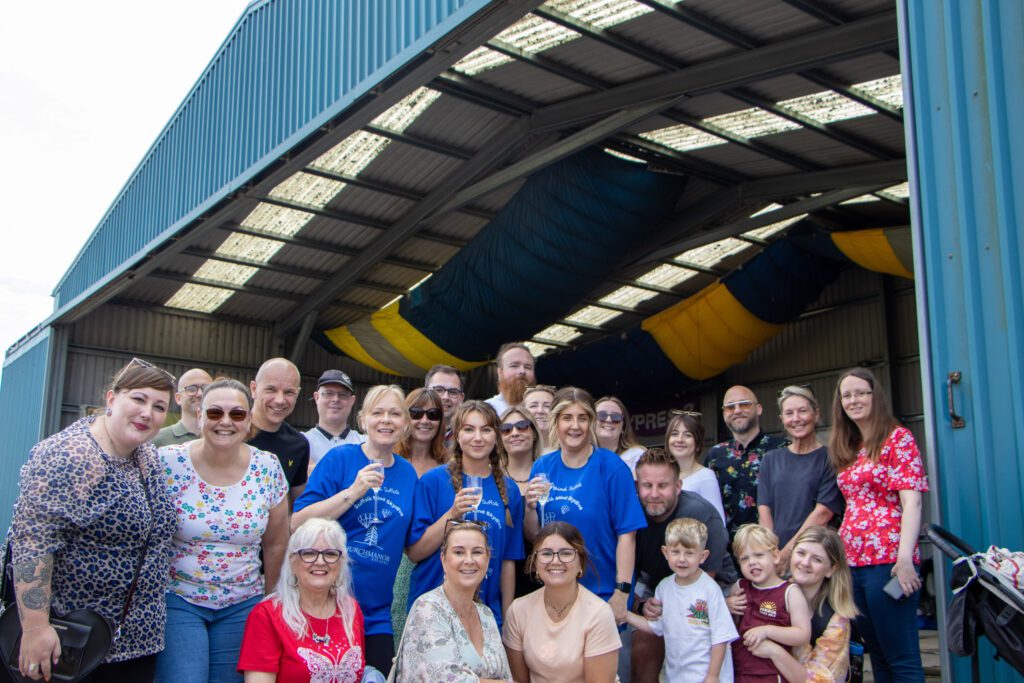
This year’s event was made possible thanks to the generous support of sponsor Churchmanor Estates.
The firm’s Head of Communications, Emma Proctor King, was one of those lucky enough to dive before the afternoon’s change of weather.
Emma, who raised £2,180 for her skydive, said: “They say do one thing every day that scares you – I think I’ve got enough credit for the rest of the year.
“Hurtling towards the ground at 150mph wasn’t exactly my usual Saturday, but raising money for such a great cause as Suffolk Mind made the panic worth it.
“10/10 would recommend… once.”
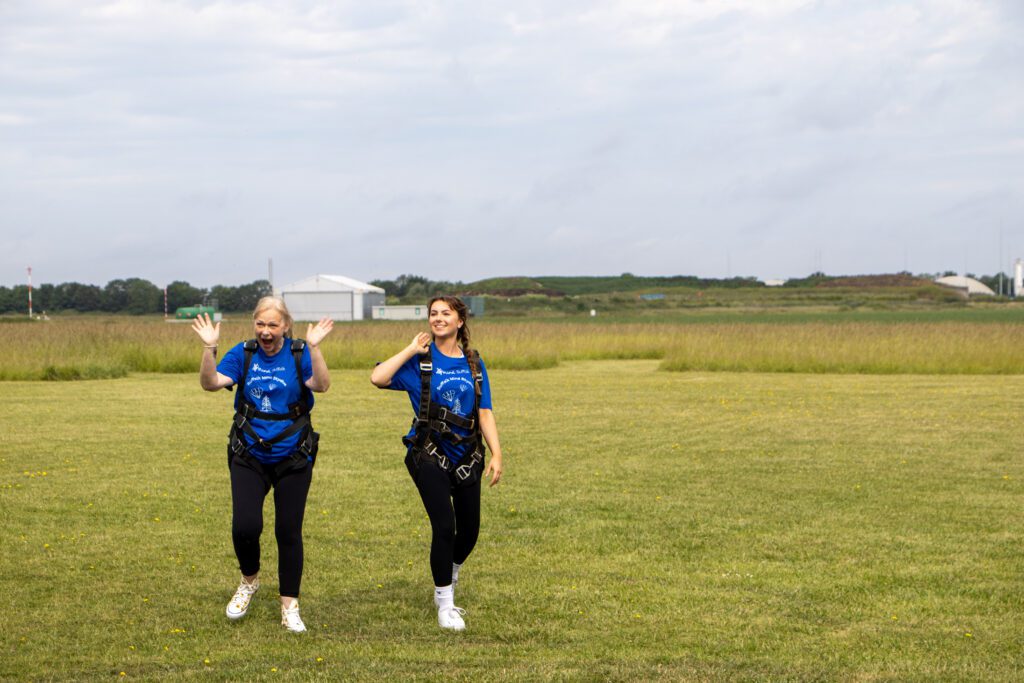
Jon added: “Both congratulations and thanks are in order for Emma and her team for their continued support of our work throughout the county.
“We would never be able to put on events like this without our incredible network of sponsors.”
Spaces for our next big fundraising event, our annual Colour Rush, remain available.
View the Suffolk Mind Skydive galleryWe’d like to say a big THANK YOU to all of these fantastic businesses and individuals who have helped us raise vital funds for Suffolk Mind this month.
Ben Lane, TNFC and friends


Thank you to Ben Lane, TNFC (Thursday Night Football Club) and friends who took part in Play on the Pitch at Ipswich Town Football Club last month to mark the group’s 15 year anniversary. Ben noted that having TNFC has been great for the group’s mental health, and several players have stated that football has helped them through stress and difficulties in their lives. The team raised an incredible £355.54 at Play on the Pitch, which could fully-fund six counselling sessions for someone in need of our support. Thank you so much!
Coes
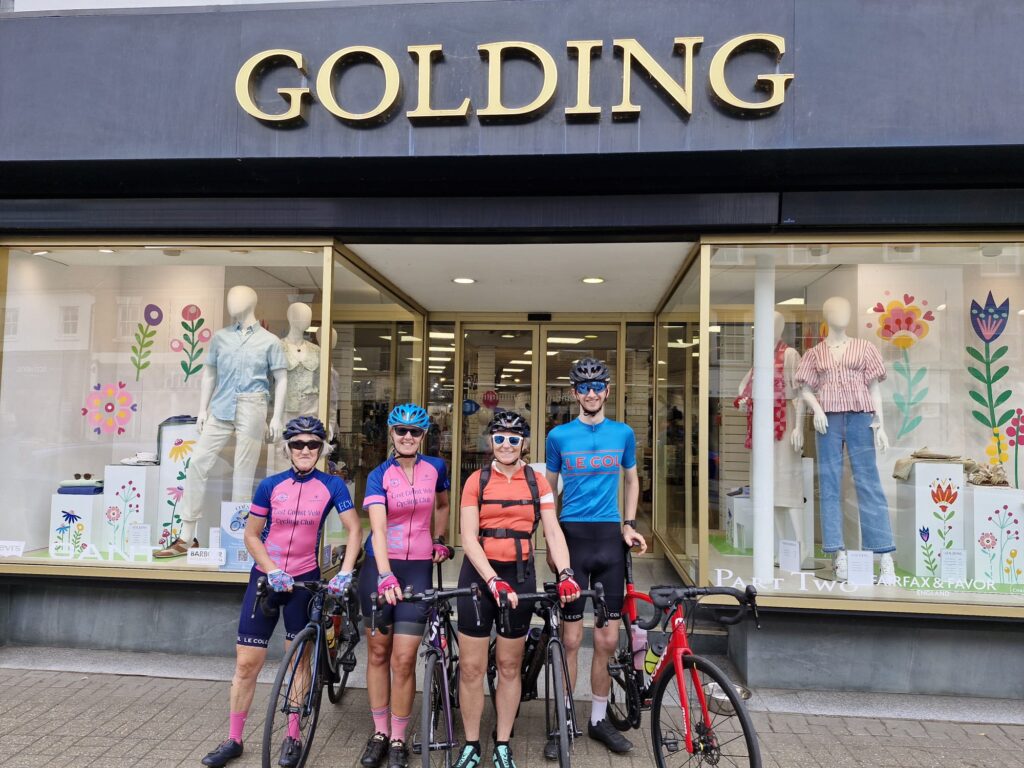

Thank you to Coes, who created a cycling challenge to raise awareness of Suffolk Mind. Members of the team took part in the challenge on Saturday 5 July, which saw them cycling between the five stores across Suffolk, a total of 151 miles! Coes also had a static bike located in its Ipswich store for staff and customers to keep ‘spinning’ throughout the day! Our CEO Jon even popped along to have a go! They managed to raise more than £1,600 for Suffolk Mind, and this amount could enable our CFYP team to take our Skill-shops for Young Minds programme into a secondary school for two groups of 10-12 students. This programme helps young people to better understand their brain and empowers them to have the skills and strategies to look after their own mental health. Thank you all so much!
Frankie Rutson
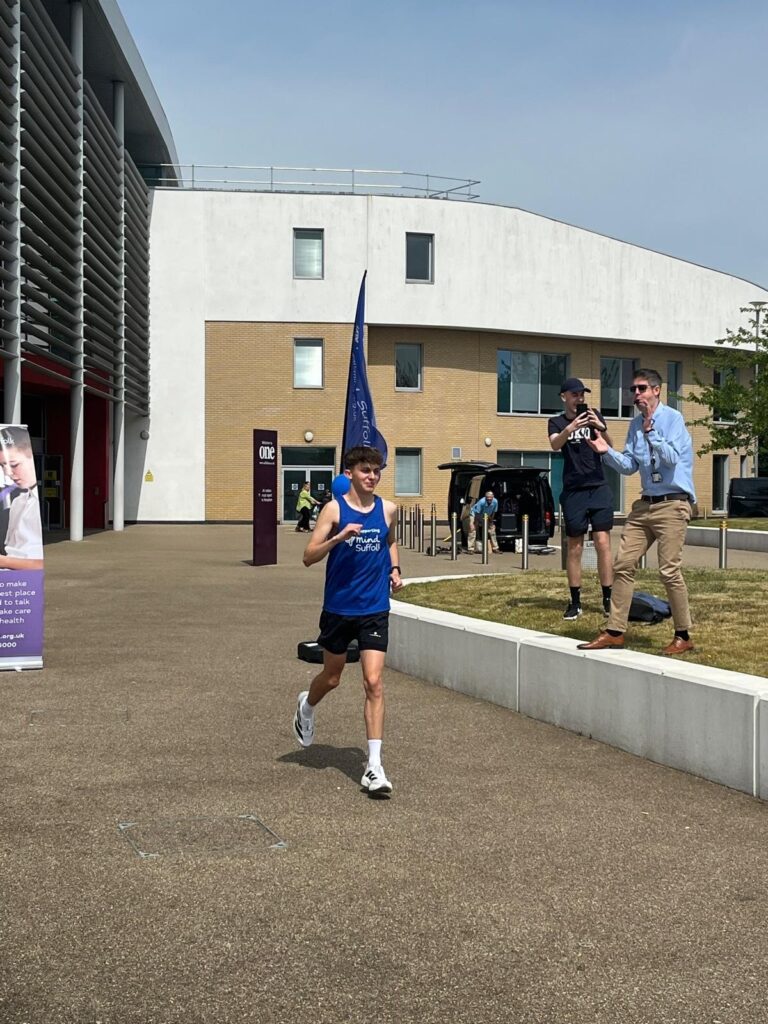

Thank you to Frankie Rutson, who completed a huge challenge for Suffolk Mind, running 60km from ONE Sixth Form to Ha’penny Pier in Harwich! Frankie raised an amazing £1,235, which could provide 23 fully-funded counselling services for people in need, or enable our CFYP team to present our Life Hacks for Young Minds for six large groups in secondary schools. Thank you Frankie!
Mahala Nicholls
Thank you to Mahala, who took part in the Orwell Challenge Half Marathon last month! Mahala smashed her target, raising £380 for Suffolk Mind. This could fund our Helpline for 15 hours or provide six fully-funded counselling sessions for someone in need. Thank you Mahala!
Nova Automotive Group

Thank you to Nova Automotive Group, who raised £884 from a raffle in aid of Suffolk Mind at their staff summer party! This amount of money could enable our CFYP team to present our Life Hacks for Young Minds assembly to two groups of students, helpling them consider specific challenges to their age group and giving them support to stay well. We hope you all had a brilliant time at your summer party and thank you so much for your support.
Vivo Clean
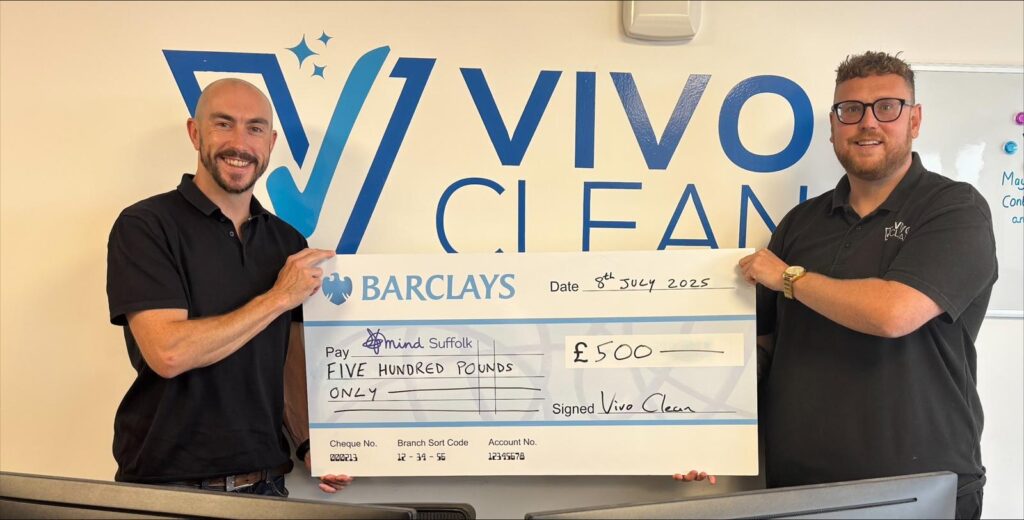
Thank you to Vivo Clean, who raised a fantastic £500 for Suffolk Mind at the Suffolk Show in May! This could allow our CFYP team to work with two classes of primary school children using our Sammy the Sea Squirt Movement Sessions, helping them understand the link between movement and good mental health. Thank you Vivo Clean!
Fancy fundraising yourself? There’s all sorts you can do on our events page or, if you have your own fundraising idea, get in touch with the team.
Suffolk Mind hosted its inaugural Stand Up For Mental Health night at Seckford Hall on Thursday, June 26 – with guests treated to a host of national and local comics alongside a Greek street food feast.
The night was headlined by Mock the Week and Live at the Apollo regular Angela Barnes, with support from fellow stand-ups Shazia Mirza, John Mann and local MC Louie Green.
In total, comedy lovers raised £2,000 – enough to fund our Helpline for two weeks or provide 40 counselling sessions.
Our Corporate Partnerships Manager Henry Tapp said: “Our first-ever comedy night was a roaring success and yet another example of how you really can put the ‘fun’ in fundraising.
“The comics had us all in roars of laughter throughout, with Angela opening the show on a high with her renowned and hilarious way of spinning a yarn.
“The amount we have raised will make a real difference in supporting our mission of making the county the best place in the world for talking about and taking care of mental health.
“A huge thanks goes to Louie and the team at Glass Eye Comedy for helping us put on the night, alongside our incredible sponsors MSC, Greenscape Energy, Hudson Group, Bates Wells & Braithwate, Pound Gates, Pitkin & Ruddock, and TMJ Interiors.”
Further fundraising events planned for us this year include our annual Colour Rush in October, while runners will also be working up a sweat to raise money at the Larking Gowen Ipswich Half Marathon in September.
A local family channelled their grief into a golf day fundraiser to remember keen golfer, Barrie Tingley. Paul Tingley wrote and shared the family’s story with us.
“This past year has been incredibly tough for our family, following the loss of our dear Barrie.
“Losing a loved one to mental health struggles is a pain no one should have to endure. But from tragedy, we found purpose.
“In honour of Barrie, we came together to organise a charity golf day in support of Suffolk Mind, an organisation dedicated to providing mental health support and resources.
“Barrie was a keen and talented golfer. He loved nothing more than to shoot a round with his friends and family and add his wicked wit to the occasion with well-chosen banter, masking the true pain he constantly battled during his adult life.
“It was his release from his pain and suffering and what better testament to Barrie than to arrange an occasion in which he would have been in his element.
“What happened next was truly overwhelming.
“Businesses and individuals alike, all of whom knew Barrie personally, stepped forward with generosity beyond words.
“Thank you to everyone who contributed, whether by donating, playing golf, or simply spreading awareness, to help us raise an absolutely incredible £22,365 for Suffolk Mind.
“This was more than just a fundraiser. It was a huge collective statement that mental health matters; that no one should feel alone in their struggles; that together, we can make a difference.
“Thank you to everyone who stood by us on this journey. Let’s continue the conversation for many years to come, help to raise awareness, and support those who need it most.”

Jon, our CEO, wanted to thank them for their support:
“I want to say a massive thank you to Steve and Paul Tingley who organised a golf day in memory of their brother, Barrie. They have raised, along with their supporters, £22,365 including Gift Aid.
“I know that they would like to extend their thanks to the 19 hole sponsors, nine auction prize sponsors and donors and the 20 raffle prize donors for their support. And of course, to everybody who came out on the golf day itself.
“I know that they’ve had a difficult year since they lost their dear brother, Barrie.
“As they say, losing a loved one to mental health struggles or mental ill health is a pain that nobody should endure and they’re absolutely right.
“We want to be here for everybody that is struggling with their mental health no matter who they are, where they live in Suffolk and whatever their circumstances. Raising money in this way helps us to do exactly that.
“For example, £22,000 could fund our Helpline for nearly half a year or help hundreds of people to access subsidised or free counselling services so that more families don’t have to endure what Steve, Paul and their families have gone through.
“Barrie was a keen golfer, and what better way to honour his memory and to help people in Suffolk by running a golf day.
“We’re incredibly grateful to them and to everybody who has stepped up and supported it.”
View the golf day gallery—
In memory of Barrie Jon Tingley
11 December 1969 – 29 March 2024









